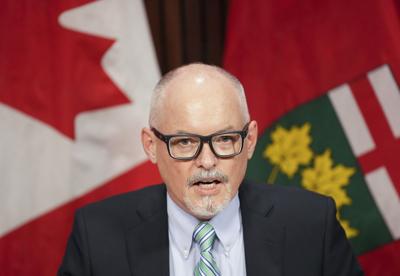Ontario needs a vaccine registry to make it easier for people to track their shots and for public health units to track immunization levels in real time during surges in disease, Ontario’s chief medical officer says in his annual report, calling on the province to do a better job fighting “a decline in vaccine confidence.”
The recommendations from Dr. Kieran Moore follow criticisms of Premier Doug Ford’s government over a major measles outbreak that began in southwestern Ontario last October and has grown to more than 2,000 cases — the province’s worst such outbreak in many years.Ěý
“The absence of a centralized information system makes it extremely challenging to identify and respond to coverage gaps,” Moore acknowledged in the , which cited an Angus Reid survey suggesting only 67 per cent of parents would vaccinate their children “without hesitation” in 2024, down from 88 per cent in 2019.
Moore noted Ontario has increased its investment in vaccination programs by 400 per cent since 2014, including a recent expansion of eligibility for RSV shots to anyone 75 or olderĚýin a bid to reduce expensive hospitalizations.
“To ensure continued progress, Ontario must address remaining gaps,” added Moore, who became the province’s chief medical officer of health four years ago at the height of the COVID-19 pandemic.Ěý
“Although routine vaccines have saved the lives of thousands of children, access remains uneven in some communities. At the same time, misinformation and vaccine fatigue continue to erode public trust in the safety and importance of immunization.”
The office of Health Minister Sylvia Jones said Thursday that the government is working to modernize “how immunization records are collected, accessed and used.”
A registry is long overdue because health units are “flying blind,” without one, said New Democrat MPP Robin Lennox (Hamilton Centre), a physician.Ěý
“We’re just waiting for, essentially, the next match to get lit and see a fire go through anyone who’s unimmunized.”Ěý
Improved vaccinations and tracking of them can help save the health system money in addition to preventing illnesses, said Liberal MPP Lee Fairclough (Etobicoke-Lakeshore), a former hospital executive.
“There should be a sense of urgency,” she added. “We are falling behind other provinces (on vaccination tracking). We’ve been seeing the consequences of that.”
Many of the measles cases were traced to a Mennonite wedding in New Brunswick last fall. Until the outbreak, the disease had been considered eradicated in Ontario for two decades.
Regional public health units in St. Thomas and Chatham slammed the province last spring over lack of a registry that could have helped them determine whether vulnerable area residents were listening to pleas from Moore, Ford and Jones to get measles shots, which could have helped officials adjust their outreach and pop-up vaccine clinic strategy.
“The majority of vaccination uptake remains at the primary care level, and without a provincial vaccine registry with real-time data, there is no system currently available that can provide this information,” the Southwestern Public Health Unit in St. Thomas said at the time.
In terms of fighting vaccine hesitancy, Moore said “ambassadors” from various communities where there is resistance to immunization can effectively be used in fighting misinformation.
Efforts like that are increasingly important, particularly with Florida planning to eliminate all childhood vaccine mandates, said Lennox, who has seen an ambassador program work effectively in Hamilton.
“We should be absolutely waking up right now in Ontario and saying this could be a catastrophe for us if we see parents and families looking at news from south of the border and deciding not to vaccinate their children.”
Moore also urged Ontario to push for a national immunization information system and a harmonized vaccine schedule to ensure “consistency” in immunizations across the country, and for more development and manufacturing of vaccines in Canada.Ěý
“Ontario must also be ready for emerging threats, from outbreaks of infectious diseases, such as measles, to future pandemics.”
Error! Sorry, there was an error processing your request.
There was a problem with the recaptcha. Please try again.
You may unsubscribe at any time. By signing up, you agree to our and . This site is protected by reCAPTCHA and the Google and apply.
Want more of the latest from us? Sign up for more at our newsletter page.

























To join the conversation set a first and last name in your user profile.
Sign in or register for free to join the Conversation